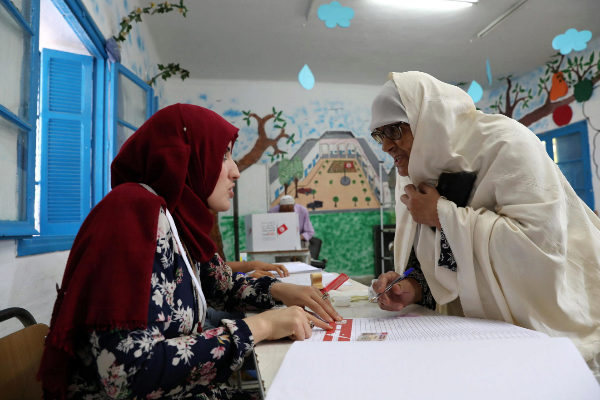- Tunisia: Young people turn their backs on Parliament
- Maghreb: Tunisians vote for a new Parliament amid growing distrust of the political class
- Four days after the elections, the candidate for the Presidency of Tunisia Nabil Karui is released
The Islamic religious conservative party "Ennahda" won the legislative elections last Sunday in Tunisia, which have left a hugely fragmented parliament, the Independent Higher Election Instance (ISIE), the body that oversees the consultation , said on Wednesday.
According to the preliminary results offered by the aforementioned agency, the Islamist formation would add 52 of the 217 seats of the House, 17 less than those obtained in the 2014 elections, when it was the second most voted force.
In second place was "Heart of Tunisia", the party founded by the presidential candidate Nabil Karoui, won 38 seats followed by the leftist "Democratic Current" with 22 and the fundamentalists of "Al Karama", with 21.
On the other hand, the "Free Desturiano Party", integrated by the nostalgic of the dictatorship of Zinedin el Abedin Ben Ali, won 17 seats while the socialist "People's Movement" and "Tahya Tounes", party of Prime Minister Youssef Chahed, They got 14 each.
The results show that the independents added 33 seats and confirm the almost definitive collapse of the Nidaá Tounis secular platform, founded by the late President Beji Caïd Essebsi, and winner of the 2014 elections, which has gone from 86 seats to only 3.
The Instance also announced the partial annulment of several electoral lists, both in Tunisian territory and abroad, due to infractions committed during the campaign, mainly in unauthorized political advertising on social networks.
In total, more than 1,500 electoral lists were presented in all the constituencies of the country; of them, about 720 represent independents, 700 to parties and 160 to coalitions. In addition, 15,000 candidates aspire to occupy the 217 seats of the Assembly of People's Representatives (ARP).
The day was marked by a low participation in just 41% of the electorate, 25 points less than in the first free legislative sessions held in 2014.
According to the Tunisian Constitution amended in 2014, the party that wins the elections will have two months to present an Executive and gain the support of 109 deputies.
In case of failure, the president of the Republic may entrust a person with the formation of that cabinet, for which he will also have a period of two months and will need the support of the simple majority of the deputies of the chamber.
On Sunday, Tunisians are called back to the polls, for the third time in less than a month, in the second round of the presidential elections in which ultra-conservative jurist Kaïes Said and television populist Nabil Karoui will face.
The Tunisian Justice ordered this Sunday the release of the latter, who remained in pretrial detention since last August 23 accused of an alleged crime of tax evasion and money laundering.
According to the criteria of The Trust Project
Know more- Tunisia
InternacionalMuere Ben Ali, the autocratic president of Tunisia whose fall unleashed the Arab Spring
Maghreb University professor Kais Saied wins in the first round of the Tunisian presidential elections and discards alliances
Maghreb Duel of 'outsiders' in the second round of the Presidential elections in Tunisia

